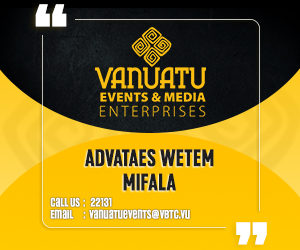“You are no longer Benina Rangvanu. You are Benina only.”
These words echoed through the hearts of family and friends as Benina stepped into marriage—not just as a bride, but as a woman returning to her roots. Raised in New Zealand with strong Tongan and Nivan ties, Benina’s journey home was more than a wedding. It was a reconnection. A reclamation. A moment where love met kastom.
Where We Come From
“We are the children of the land. The land is our mother and father.” That truth anchors the voices in Love Mo Kastom, a locally produced film that captures modern love woven through traditional roots. For Benina and her husband, Kersom Richard, the ceremony was more than symbolic. It was deeply ancestral.
Benina’s father, a Vanuatu community leader in Auckland, passed away when she was just 11. It was only later in life that she realized what he had left behind wasn’t just grief—it was a path home.
“I feel like, for me, my identity is complete,” Benina says. “I know his siblings now. I know their children. I’m close to them. I feel part of his story.”
A Wedding of Two Worlds
In Vanuatu, marriage isn’t just about two people—it’s the meeting of two families, and two ways of life. “Marriage in kastom is an exchange,” Tatavola Matas , Coordinator for Vanuatu Women’s Centre explains . “At its most basic, it’s the giving of gifts—mats, pigs, island food—but it’s also the giving away of a life.”
Humphrey Tamata ( Uncle of the bride) describes the red mat ceremony with reverence. “If someone gives you a mat and places it over their head, they’re saying: ‘I honor you above myself.’ You have to walk around them three times to accept it respectfully. That’s what custom teaches us—dignity.”
Kersom and Benina’s wedding was full of such moments: the white powder dusted onto her face to mark a life milestone, the keys handed over by her four brothers for her glory boxes, and the final embrace from her uncle as he gave her away on behalf of a father who couldn’t be there.
“It felt like more than just him. It felt like my dad. It felt like everyone.”
The Cost of Tradition
But tradition carries weight, especially for young couples navigating modern life. “Man, you have to be ready to get married,” says Kersom. “It’s not just love—it’s preparing food, hosting everyone, making custom payments.”
The earthquake that struck Vanuatu weeks before the wedding added more pressure, disrupting travel and venues. Benina says, “It was 100% stressful. We had to move everything—more than 500 guests, families from Malekula, overseas relatives. But we made it.”
The issue of bride price also caused deep reflection. “People still say, ‘You paid for her, so she’s yours,’” Benina admits. “But I don’t want to be owned. I want to be responsible—to help Kersom’s family. But not owned.”
In Vanuatu, 53% of women have agreed with the statement: “If bride price is paid, the wife becomes property.” In Love Mo Kastom, this tension is raw and real. Benina’s story doesn’t ignore the struggle—it leans into it, hoping to make space for change while still holding onto culture.
Becoming One
Kersom’s family welcomed her with joy, but Benina still felt the pressure of acceptance. “I grew up differently. I don’t want to disappoint them.” But her own family’s sacrifices—those who slept on ship floors just to attend—reminded her of the love she carried with her.
“Seeing everyone running around—those were all my siblings, cousins, brothers. That was their way of celebrating a new life for me.”
And at the heart of it all was love. “Kersom knows who he’s marrying. He knows he’s marrying me—and my family. And I know I’m marrying him, and his family. That’s custom.”
A New Chapter
As Benina walked into her new home, carrying not just glory boxes but generations of hope, one thing was clear: this was not just a wedding.
“This is the wedding,” she said. “When you go through bride price and custom payment—that’s it. I am married. And today, I became Benina Richard.”
In that moment, love and kastom met in the truest way possible—not by forgetting the past, but by living it forward.


